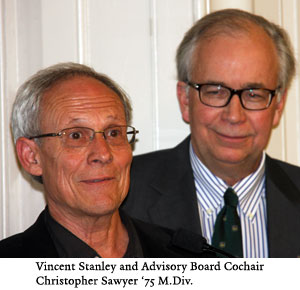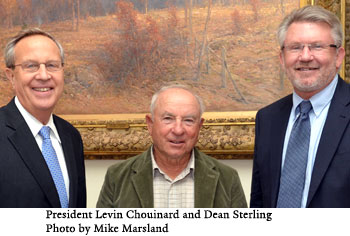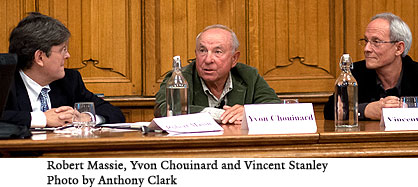Near the end of last Thursday’s event with Patagonia founder Yvon Chouinard, one of the one thousand viewers of the event online commented, “Yvon for President.”
That level of enthusiasm was palpable in Yale Law School’s Levinson Auditorium as an eager crowd listened to Chouinard and co-author Vincent Stanley discuss their book The Responsible Company: What We’ve Learned from Patagonia’s First 40 Years.
 Chouinard founded Patagonia, Inc. in 1972, after already having established a reputation as an alpinist and rock climber. His rock climbing passion and blacksmithing skills had allowed him to make a living manufacturing steel pitons for climbers. Then he realized those steel pitons were damaging the rock walls of places that he loved, including Yosemite National Park. After designing reusable aluminum alternatives to the pitons, Chouinard then expanded his business to include an outdoor clothing line.
Chouinard founded Patagonia, Inc. in 1972, after already having established a reputation as an alpinist and rock climber. His rock climbing passion and blacksmithing skills had allowed him to make a living manufacturing steel pitons for climbers. Then he realized those steel pitons were damaging the rock walls of places that he loved, including Yosemite National Park. After designing reusable aluminum alternatives to the pitons, Chouinard then expanded his business to include an outdoor clothing line.
Stanley, a writer and poet by training, is Chouinard’s nephew and was one of Patagonia’s earliest employees. He currently edits Footprint Chronicles, which addresses environmental issues while tracking the impact of the company’s products.
On Thursday, Sept. 27, Stanley and Chouinard fielded questions on corporate ethics, social responsibility, sustainability, and environmentalism in a discussion cosponsored by the Divinity School—along with the School of Forestry and Environmental Studies and the School of Management under their joint Yale Center for Business and the Environment. The conversation was moderated by Robert Massie ‘82 M.Div., president of the New Economics Institute, which supports the evolution of more just and sustainable economic practices.
“I can think of no one better suited to moderate,” YDS Dean Gregory Sterling said in introducing Massie, who in addition to being an ordained Episcopal priest has led or conceived three of the most influential environmental sustainability organizations: Ceres, the Global Reporting Initiative, and the Investor Network on Climate Risk.
Massie first offered a brief history of Patagonia’s success: The first major retailer to switch all of its cotton from chemical to organic, Patagonia was also the first to commit one percent of its annual sales to environmental causes, launching the global One Percent for the Planet campaign, which now has almost 1,500 members. Since many of Patagonia’s successes are already well known in the environmental community, Massie first simply asked Stanley and Chouinard why they wrote The Responsible Company.
 “I feel like the most important part of the book is the checklist in the back of all the things you can do,” Chouinard answered. That list—of 263 items—includes everything from “inventory carbon use” to “make things that benefit the commons.”
“I feel like the most important part of the book is the checklist in the back of all the things you can do,” Chouinard answered. That list—of 263 items—includes everything from “inventory carbon use” to “make things that benefit the commons.”
“Genius is the capacity to hold two equal and opposite ideas in your head at the same time,” Chouinard noted in explaining how he reconciles his environmental commitments with corporate priorities, “and pretty soon, we’re all going to be geniuses.”
But Chouinard stressed that Patagonia has never been driven by profits. As a private company and benefit corporation, he said that Patagonia is able to take risks that public companies cannot.
“I actually have way more power as owner of Patagonia than a CEO of a powerful company,” Chouinard said, citing Patagonia’s move from conventional to organic cotton as a risk that no public company could have taken.
Realizing that 10 percent of all agricultural chemicals in the United States are used in cotton production, Patagonia converted its entire clothing line to organically grown cotton in 1994.There was no indication that Patagonia’s move would be economically advantageous, but Chouinard said quality—not profitability—motivated the switch.
“Whenever I am confronted with a business problem, the answer is always increase the quality,” Chouinard said. Drawing corporate insights from one of his favorite sports, he said that he does the best fly-fishing with the simplest materials: “More and more, I realize that the answer is simplicity and quality.”
Those values—”simplicity and quality”—are embedded in Patagonia’s motto: “Build the best product, cause no unnecessary harm, use business to inspire and implement solutions to the environmental crisis.”
It is a motto that Stanley said inspires not only Patagonia’s products, but also its advertising. He described a controversial advertisement the company ran last year on Black Friday in The New York Times: “Don’t buy this jacket,” read the bold font above a Patagonia fleece. “If we don’t talk about the necessity to reduce material consumption,” Stanley said, “then we aren’t much in line with our values.”
 “I want to feel like I am part of the solution, not part of the problem,” Chouinard echoed, but added that consumers must have equal responsibility with companies. “We can all become better consumers, educating ourselves about what we’re buying, using that force to change society.”
“I want to feel like I am part of the solution, not part of the problem,” Chouinard echoed, but added that consumers must have equal responsibility with companies. “We can all become better consumers, educating ourselves about what we’re buying, using that force to change society.”
And there, in that effort to educate consumers, Chouinard and Stanley said faith communities have a role to play. “I think religion is still concentrated on private life and on Sunday morning,” Stanley observed, “when in fact what we really need to do is go back to this question of what it means to be a citizen, what are we as moral beings.”
Questions came not only from Massie, but various members of the audience. Jared Gilbert ‘12 M.Div. even voiced questions on behalf of those watching the event online, including one viewer in Norway.
Michelle Lewis ‘13 M.Div., a joint-degree student at the Divinity School and the Forestry School, challenged Patagonia on its engagement with low-income populations. “I’m wondering,” she asked, “what your company is doing, who you’re partnering with to address issues of access amongst underserved populations?”
That was one of questions for which Stanley and Chouinard could answer only that they hoped to do more, exhibiting the same humility that animates Patagonia (whose motto of “cause no unnecessary harm” accepts that reality that every human endeavor will cause some environmental harm) and The Responsible Company (the checklist in the appendix concedes “No company on earth can check off every item on the lists below”).
Truly an exchange, Thursday’s event allowed audience members to ask questions that both praised and posed challenges to Stanley and Chouinard. Calling the event “an extremely illuminating conversation,” Massie closed the discussion by saying he hoped it was “the first of many.”
Following the conversation at the Law School, the Patagonia authors dined with the YDS Board of Advisors, students, staff, and faculty, in the Old Refectory and fielded a few more questions. Stanley’s wife, Nora Gallagher, author of the book Things Seen and Unseen: A Year Lived in Faith, among others, is a member of the Board.
View the entire conversation here.
| Attachment | Size |
|---|---|
| 4.11 KB |